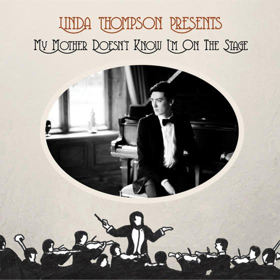Linda Thompson Celebrates Music of English Music Hall with 'My Mother Doesn't Know I'm On the Stage'

Linda Thompson's career began in the much beloved late '60s/early '70s British folk-rock scene, when she went by the name Linda Peters. At first, she was mostly a session singer and a part of a short-lived duo with Paul McNeill with whom she released two singles, in 1968 and 1969. McNeill happened to be friends with Sandy Denny, and soon so was Linda. She became one of the "supergroup" of musician friends related to Fairport Convention for the 1972 The Bunch album, a side project of sorts that highlighted rock hits of the '50s. The album's single featured Linda and Sandy covering the Everly Brothers' "When Will I Be Loved." Also in 1972 Linda married Richard Thompson; she and Sandy can be found in the credits for his solo debut, Henry the Human Fly. Beginning in 1974, albums started appearing by Richard & Linda Thompson, winding up with 1982's classic Shoot Out the Lights - which also signaled the end of their marriage.
Enter the English theatre. In 1984, Linda was singing with the Home Service at the National Theatre's production of medieval mystery plays before releasing her first solo album, One Clear Moment, in 1985. In 1987, the song "Telling Me Lies" from that collection was covered by Emmylou Harris, Dolly Parton and Linda Ronstadt for their Trio album and was nominated for the 1987 Best Country Song Grammy.
Unfortunately, due to dysphonia (a condition affecting her voice and ability to sing), One Clear Moment remained Linda's only solo effort until 2002's Fashionably Late, by which time she had found a will and a way to continue singing despite the dysphonia. In the 21st century, she has released or been a part of five albums to date, including the highly acclaimed Won't Be Long Now, her last solo offering, from 2013.
Which brings us to My Mother Doesn't Know I'm on the Stage, which Omnivore Recordings will make available on September 28, 2018. For long-time Linda Thompson fans, an album of comedy, theatrical and popular songs that made up the music hall music of the 18th and 19th centuries, may seem a bit of a surprise, but Linda has deep ties to the music:
"I suppose the genesis of this record is that music hall and variety (vaudeville, for my American friends), was always a big part of my life. I'm only a hop skip and a jump removed from it. My grandparents were born in the late 1800s. My parents were born near the beginning of the 20th century. My paternal grandmother had seen Marie Lloyd and Vesta Tilley, and the like. My dad grew up on Max Miller, and the Crazy Gang. He took me to theatres, both in London and Glasgow, to see shows. I missed Max Miller, but I knew every word of his act, and all of the songs. I did see the Crazy Gang, who were sensational. I actually worked with one of them in 1967. Monsewer Eddie Grey. Lovely guy. Tommy Trinder was top of the bill, something made me steer clear of him though."
With family and special guests on board, the album was mostly recorded in May of 2005 at the Lyric Hammersmith in London. While Linda sets the proceedings in motion, special guests appear quickly, such as Martha Wainwright, who performs Stephen Foster's "Beautiful Dreamer." Says Linda, "I have always loved this song. Have sung and listened to many versions of it for eons. I have never ever heard a more beautiful rendition than this. Never."
Also along for the ride is actor Academy Award®-winning actor Colin Firth, who happens to be a fan of Linda's son, recording artist Teddy Thompson. Teddy brought Firth into the project and he handles the title track with all the wit and charm the title conjures. Teddy appears as well, handling lead vocal duties on several songs.
Tony®-nominated cabaret artist Justin Vivian Bond takes a turn at "A Good Man Is Hard to Find," while music-hall singing legend John Foreman and renowned English folksinger Bob Davenport, who've been performing since the '50s and early '60s, tie the album back to its roots.
Irish folk singer Cara Dillon with Sam Lakeman, Jools Holland with the actor Roy Hudd, concertina player Roger Digby, music director Michael Haslam, Stephen Large of Squeeze, James Walbourne of The Pretenders and The Rails, and even George Hinchliffe of the Ukulele Orchestra of Great Britain all join in the fun, evoking the bygone era of the saloons and public houses where people could go to dance, sing, drink, smoke and joke, and let the cares of the world fall away for a while.
Linda sums it up perfectly: "Drunk? Us? How very dare you?" Come join the fun!
Linda and the artists will be donating all royalties earned by the record to the NSPCC (National Society for the Prevention of Cruelty to Children).
Comments

Videos
